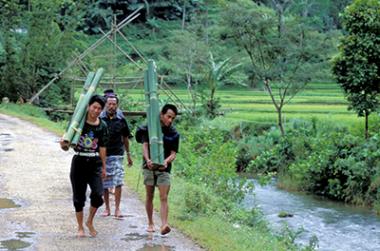Strengthening Local Governance in India

Summary
India’s national and state governments sought to build their capacity to decentralize funding and responsibilities to local governments and monitor CDD programs providing grants to communities. Indian delegates engaged in a nine-day study tour to Indonesia to learn about the structure and operations of Indonesia’s National Program for Community Empowerment (PNPM), which provides similar grants.
Challenge
India supports a three-tier governance system called the Panchayat Raj, which promotes local governance at the Gram (village), Janpad (block), and Zilla (district) levels. Within this system, Panchayat Raj Institutions (PRIs) implement economic and social programs. For several years, both the national and state governments had increased funding for PRI-related capacity building initiatives, such as the Backward Regions Grant Fund (BRGF) for underserved regions and the Rajiv Gandhi Panchayat Sashakthikaran Yojana for community capacity building.
The states of Kerala, Karnataka, and West Bengal, however, lacked the capacity to manage and administer PRI programs and to support decentralization efforts. Indian officials wanted to learn from other countries that had developed, implemented, and monitored CDD and local government grant programs, particularly to enhance their accountability, responsiveness, and inclusiveness.
Solution
Tapping an awareness of good practices, Bank staff proposed a visit to Indonesia to learn from its successes in CDD and local governance. Indonesia could share lessons related to its National Program for Community Empowerment (PNPM), which provides block grants to local communities to support development projects and improve livelihoods in urban and rural areas. Indian authorities were interested in the PNPM as it was comparable in scale to their programs, combined monitoring and evaluation with policy-oriented research, supported efforts to control corruption, and included different ways of disbursing grants. Bank staff proposed a second visit to China to learn about its decentralization efforts, but scheduling difficulties prevented that visit.
The study tour to Indonesia took place November 14 – 22, 2011, and included officials from the national government; the governments of Kerala, Karnataka, and West Bengal; and the Backward Region Grant Fund. The visit aimed to increase officials’ skills in managing, monitoring, and evaluating large-scale CDD grant programs.
In Indonesia, the delegates had meetings and attended workshops with agencies involved in the PNPM and also visited beneficiary communities. Delegates spent five days in Eastern Indonesia, where they met with officials to discuss the operations, bookkeeping, and monitoring of the PNPM, and visited Takalar, Maros, and Pangkep to investigate community projects and women’s savings groups. Delegates also discussed PNPM operational matters with staff from donor agencies, such as the Japan International Cooperation Agency (JICA) and Oxfam International. Lastly, delegates flew to Jakarata for two days of meetings with Indonesia’s Ministry of Development Planning (BAPPENAS) and PNPM representatives to learn more about how the PNPM had integrated CDD approaches.
Results
The exchange strengthened the capacity of national, state, and BRGF officials to support local government programs and CDD approaches within PRI programs:
- Delegates increased their awareness of ways to manage local governance programs, decentralize funding and functions, and implement community development grants under the BRGF.
- Officials increased their skills to monitor and evaluate community grants under the BRGF and other acts supported by the PRIs, with a view to enhancing the accountability and development results of these grants.
The exchange strengthened networking among Indian and Indonesian officials. Champions of reform at India’s federal and state levels were able to share experiences with each other and with the Indonesian counterparts. These ties were expected to facilitate future knowledge exchange and possibly follow-up visits by Indonesian counterparts to India.
Lessons Learned
- When brokering knowledge exchanges, it is important to select countries that have addressed similar challenges and are at nearly similar stages of development.
- It can be difficult to arrange government officials’ schedules for study tours, making multi-country visits problematic.
- Organizing knowledge exchanges within the framework of an ongoing development program can maximize exchange results.
World Bank Group Contribution
World Bank specialists helped to broker this exchange and identify relevant PNPM experiences that would address India’s needs. Bank staff worked with the Indonesia Country Office to set up the Indian officials’ visit to Indonesia. A grant of about US$18,600 from the South-South Facility and funds from state governments funded their travel.
Partners
The following agencies and donors from Indonesia shared lessons about how the PNPM had been developed and implemented:
- Districts government of East Nusa Tenggara, which supported dissemination of PNPM grants to local communities for development projects
- Oxfam International, the Japanese Development Cooperation Agency (JICA), and the Australian Community Development and Civil Society Strengthening (ACCESS) Program
- The National Ministry of Development Planning (BAPPENAS), which has broad oversight over the PNPM program
- Ministry of Home Affairs, Directorate General for Community Empowerment
- Ministry for Disadvantaged Areas
Moving Forward
Since the exchange, senior Indian officials have taken steps to develop plans to improve the monitoring and evaluation systems in the BGRF and state programs.
Beneficiaries/Participants
The Indian delegation included the following officials:
- Amit Roy Chaudhury, Joint Director, Directorate Wing of Panchayat and Rural Development, Government of West Bengal
- Sabyasachi Sarkar, Procurement Manager, Government of West Bengal
- Rajesh Kumar Singh, Secretary, Local Self-Government Department, Government of Karnataka
- Pappinessary Puthanveettil Balan, Institute of Local Administration, Government of Kerala
- Avtar Singh Sahota, Economic Advisor and Joint Secretary, Government of India
- Susan George, Director, Backward Regions Grant Fund, Government of India

 China
China Colombia
Colombia Denmark
Denmark India
India Indonesia
Indonesia Mexico
Mexico Russian Federation
Russian Federation Spain
Spain United Kingdom
United Kingdom